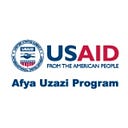Community interventions key to promoting breastfeeding
Women like Valentine have benefited from innovative interventions by Afya Uzazi to promote good nutrition for mothers and their babies.

Although infant and young child nutrition has improved in Kenya, many children still suffer the effects of malnutrition, such as stunted growth and wasting.
Breastfeeding gives babies a good start to life and combined with the right complementary foods given at the right time, from the seventh month, can help to prevent malnutrition.
But many children miss out on the benefits of breastfeeding due to lack of awareness among parents and other barriers such as strong cultural beliefs. They do not get started on breastfeeding immediately after birth, and are given food before six months or stop breastfeeding too early.
While 99% of children in Kenya are breastfed, only 3 in every five children start breastfeeding in the first hour after birth and only two in five are exclusively breastfed for four to five months.
Nutrition for children between 6 and 23 months is also sub-optimal, with only 50% of children getting the minimum number of meals per day and 41% receiving 4 or more food groups per day.
Valentine Chebii, a 21-year-old mother of four in Baringo County did not exclusively breastfeed the first two of her four children.
“I gave my children porridge and other foods when they were only three or four months old,” says Valentine, a resident of Kambi Turkana.
Valentine’s two children fell ill often, mostly with diarrhea. She spent a lot of time and money taking the children to the hospital and caring for them at home.
But the case is different with her youngest children, twin brothers now heading to their sixth month. She has given them only breast milk, which is enough to meet their nutritional needs. The boys are healthy and very active.
“I suspected that I could be carrying twins because my pregnancy was bigger compared to the others,” Valentine says.
She delivered the twins at the Marigat Mission Hospital. At the time, she did not know about the benefits of exclusive breastfeeding. Neither did she know that twins could survive on breast milk only for six months.
After valentine had delivered, a healthcare worker told her about the benefits of exclusive breastfeeding for six months. At first, Valentine was skeptical. She found it hard to believe that breast milk alone could satisfy both babies, but the nurse convinced her that with a proper diet, she could produce enough milk for the twins.

The nurse enrolled Valentine in a mother-to-mother support group so that she could learn from other mothers and share her own experience.
In the group, Valentine learned the importance of exclusive breastfeeding, how to position the baby during breastfeeding, the importance of good nutrition, and about family planning.
“Compared to my first two children, my twins have never been ill,” says Chebii.
Despite concerted efforts to create awareness about the importance of antenatal care, many women attend only one of the four recommended clinic visits. These women miss out on important lessons about pregnancy and childcare. As a result, harmful traditional practices such as giving children herbs or foods before breast milk persist, depriving babies of nutrients and exposing them to infections.

Nelly Nabori, a nutritionist at Marigat, knows Valentine well.
The nurse regularly joins the support group to provide health education and refer mothers or children who require various services to the local health facility.
“I teach mothers on good nutrition for themselves and their children,” says Nelly.
Occasionally, she joins community volunteers on household visits to follow-up on some of the women and encourage them to continue breastfeeding.
Nelly is one of the government health workers that USAID’s Afya Uzazi program has trained to support various interventions to address malnutrition. These interventions include the following:
Baby-Friendly Community Initiative (BFCI): Promotes mother-to-mother support groups.
Binti Shujaa Model: Creates psychosocial groups for pregnant and lactating adolescent girls.
Champion Community Model (CCM): Encourages pregnant and postpartum women and babies up to one year of age to practice key accelerator behaviors to bridge the gap between information and breastfeeding practices.
In each of these different intervention models, nutritional information and guidance was delivered to participants to promote healthy nutritional behaviors.




Related Stories
1.Hail to the childcare champions!:https://medium.com/@afyauzazi/hail-to-the-child-care-champions-e7781a00633b
2.Empowering young mothers: https://medium.com/@afyauzazi/empowering-young-mothers-183a66c9a665
Story by Denise Akun and George Obanyi/ Afya Uzazi
